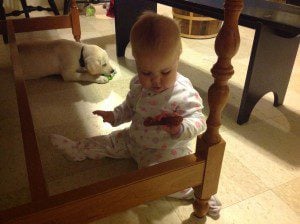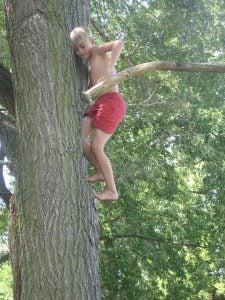My sister-in-law wanted to know what kind of crazy you have to be to get a dog right after you’ve had a baby, because the record shows, I did this five years ago too–got a dog when my youngest was about four months old. I’ve had to conclude that the dog, for me anyway, flows rather naturally from the event of the baby.
Something in my brain fires up when I’ve just had a child. I’m more alert, more empathetic, more aware of potential dangers in my environment, and more willing to get off my duff in order to protect my people. I’d guess it’s a mother-henning tendency, so it makes sense in my post-partum brain to extend the tendency to other lives–any life that wanders into my locus of operation.
But the dog does something for the baby too. I know that there is a window for dogs, a pretty brief one, where the dog’s experiences in puppyhood sort of determine how he will respond to things as an adult. I’m aware that he needs to be exposed to all different kinds of people and situations, and that I have a responsibility to instill positive feelings with these events, so that he won’t develop a habit of responding with fear or agitation to unexpected occurrences.
At our house, the dog has to be friendly to unknown children and delivery truck drivers, meter readers, and strange cars picking up and dropping off my older kids. So I’m aware that every new experience the dog has is just that–new–and that I need to be there to help him navigate it.
The concept that new life requires an accompaniment came very naturally to me when my oldest kids were babies. I took a lot of pleasure in getting down on the floor with them, turning over rocks in the yard, teaching language, and exposing the kids to new things. The zoo was a fun place to visit for a couple years. I thought it was funny to dip a kid’s toes in cold water and see how it affected them.
But somewhere along the line, I stopped discerning what was new to my children. I stopped introducing and presenting the world to my later kids, because I got tired of it, forgot it was new, or was otherwise occupied with the older kids and their things and the baby was just along for the ride.
I know that a baby can learn a lot by just being along for the ride. In spite of his late start, my fourth child is in many ways the most competent and reliable of all my kids. He’s caught up verbally and numerically, and he’s very social and pleasant to be around. But there’s something in it for adults, for me, specifically, to be alert to the knowledge deficits in the people and creatures around me, to recognize my role as a teacher.
If I had it my way, I’d spend as much of my life as possible in silence. Really, when the kids are at school, I rarely vocalize anything, unless someone calls me, in which case, sometimes I answer the phone. It doesn’t come naturally to me to talk to someone who can’t talk back. It’s something I don’t really understand, since I’m extroverted otherwise–I enjoy being alone, but it’s not a necessity for me.
When I was twenty-four, I loved this business of being a teacher, reading aloud to an infant who could not possibly understand the content of what I was saying, but at thirty-eight, I need some external stimulus, some reminder that I have to teach this baby to say “hands” and “toes.” I must play patty-cake. I must sing. The world is old to me, but it’s new to you, and I’m going to help you figure it out.
Somehow, this concept sinks in a little deeper when you bring a whole new species into the house and try to teach it your human ways. It makes you look at the world and notice a danger here, a point of interest there, and you’ve got to watch the bugger closely, or he’ll eat your house. Curiosity and concern on the part of the mother always benefits a baby–even if it takes a dog to bring it out.















